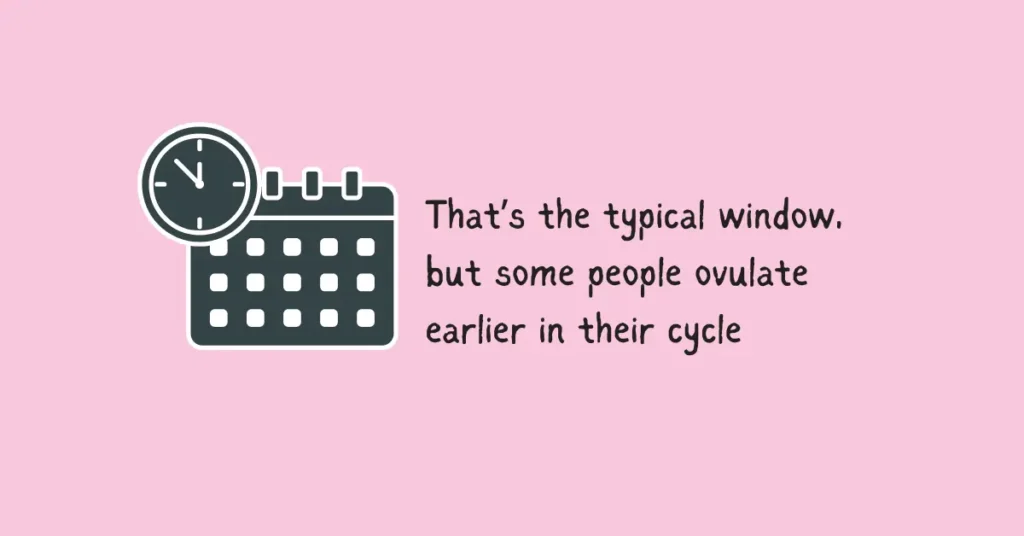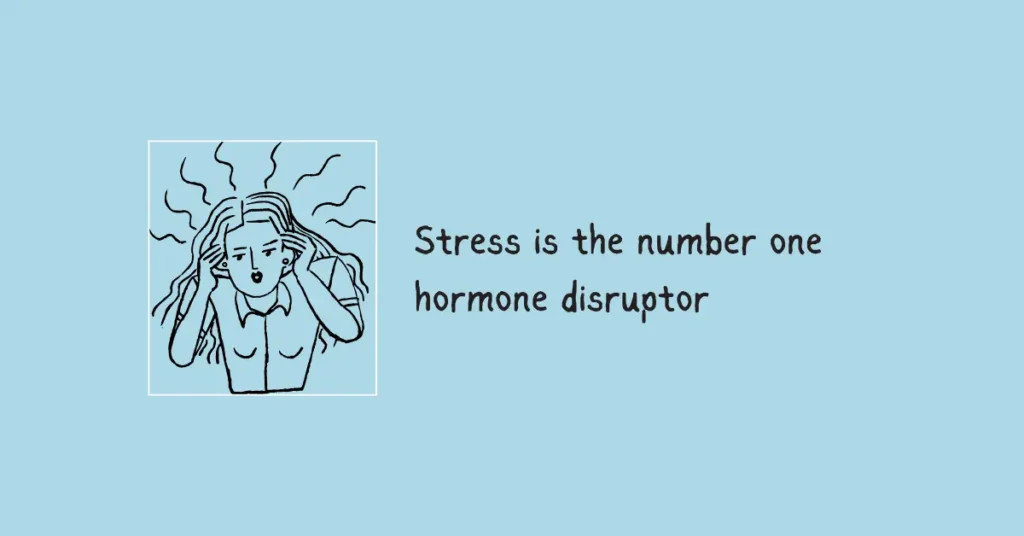Late Period Besides Pregnancy, this is a topic that so many of us have experienced but don’t always talk about. Specifically, I’m going to share six reasons for late periods that have nothing to do with pregnancy.
If you’ve ever been in a situation where your period is late and you’ve had that moment of panic, trust me, this is something that probably most of us have experienced at least once in our menstruating years. And I want you to know that before you freak out over your next late period, there are other reasons why it could be happening.
List of Six Reasons for Late Periods
Yes, it might not be pregnancy, although it’s always good to test for that just in case. But I want to talk about why late periods happen that aren’t related to pregnancy. So, let’s just move the pregnancy thing out of the way and focus on what else could be going on.

1. Delayed Ovulation
The first and most common reason your period might be late is delayed ovulation. When your ovulation is delayed, it changes the timing of your period.
Let’s break this down a bit.
- When you ovulate, it usually happens about 14 to 20 days after your last period started. That’s the typical window, but some people ovulate earlier in their cycle—like on day 10, 11, or 12—while others ovulate later, around day 25 or even day 30.
Why does this matter?
Because ovulation directly affects when your next period will come. After you ovulate, you move into the luteal phase, which is the second half of your cycle. The luteal phase is usually 12 to 14 days long and is pretty consistent for most people. Unless you have low progesterone, which might shorten it, or a longer luteal phase (15-16 days), this phase doesn’t change much.
So, if you ovulate later than usual, your period will also come later. For example, if you typically ovulate on day 15 but one cycle you ovulate on day 25, your period won’t come until around day 37.
Why does ovulation get delayed?
That’s where things get interesting. There are so many factors that can affect ovulation, and I’ll get into those in a bit. But the key takeaway here is that ovulation dictates your cycle. If it’s delayed, your period will be, too.

2. Stress
Let’s talk about stress because it’s a HUGE factor when it comes to delayed ovulation and late periods. Stress affects your hypothalamus, which is the part of your brain that regulates hormone production and your menstrual cycle.
When you’re going through a really stressful or traumatic time, your body might delay ovulation—or even stop it altogether. And this isn’t just about the obvious stressors like work deadlines or relationship issues. Sometimes, stress can come from things you don’t even realize are affecting you.
For example, traveling across time zones can mess with your cycle. Even though it might not feel like a big deal, your body perceives it as stress. Similarly, illness or injury can put a lot of stress on your body, which can delay ovulation.
The bottom line? Stress is the number one hormone disruptor. If you’ve been stressed out lately and you’re wondering, “Why am I late on my period?”, stress could very well be the reason.

3. Under-Eating or Over-Exercising
Another major reason for delayed ovulation and late periods is under-eating, especially when it’s paired with over-exercising. I’ve talked about this before, but it’s worth repeating because it’s such a common issue.
Under Eating Causes Late Period
When you’re not eating enough, your body doesn’t get the fuel it needs to function properly. This can directly affect your menstrual health, causing delayed ovulation or even stopping it altogether. Your body essentially goes into survival mode and says, “Hey, we don’t have enough energy to support a pregnancy right now, so let’s hold off on ovulation.”
Over-Exercising Causes Late Periods
The same goes for over-exercising. Even though exercise is generally healthy, too much of it—especially if you’re not eating enough to support it—can put stress on your body and disrupt your cycle.
This is why it’s so important to fuel your body properly and find a balance with exercise.
So, if you’re training for a marathon or pushing yourself hard at the gym, make sure you’re eating enough to support your activity level. Otherwise, your period might pay the price.

4. Health Conditions
Sometimes, delayed ovulation and late periods can be caused by underlying health conditions.
The most common one is polycystic ovarian syndrome (PCOS), which affects ovulation and can cause irregular cycles.
Other conditions that can mess with your cycle include thyroid disease (like hypothyroidism), diabetes, and even celiac disease. If your gut is damaged and you’re not absorbing nutrients properly, that can affect your menstrual health, too.
Hormone imbalances can also play a role. For example, if you have low estrogen, it might delay ovulation because your body needs a certain amount of estrogen to trigger it.
The takeaway here? If your periods are consistently late or irregular, it’s important to talk to your doctor. There could be an underlying health condition that needs to be addressed.

5. Your Age
Your age can also affect your cycle. If you’re a teenager, it’s completely normal to have irregular periods. Your body is still maturing, and your estrogen receptors are developing, so it’s common to have cycles that vary in length.
On the other end of the spectrum, if you’re in your 40s or older, you might be entering perimenopause. This is the phase leading up to menopause, and it can last for 10 to 12 years. During this time, your hormones are changing, and it’s common to experience late or irregular periods.
A lot of people assume that perimenopause means you’ll stop getting your period right away, but that’s not the case. You might still have periods for years before you officially reach menopause.
So, if you’re over 35 and noticing changes in your cycle, it’s worth talking to your doctor. It could be perimenopause, or it could be something else. Either way, it’s good to get it checked out.

6. Hormonal Birth Control
It’s so important to talk about hormonal birth control. If you’ve recently started or stopped using birth control, your cycle will likely change.
When you’re on birth control, you don’t actually have a period—you have a withdrawal bleed. This happens when your body sheds the lining it’s built up while you are on the pill, patch, or ring.
If you’ve just come off birth control, it can take a few months for your body to regulate its hormones again. So, don’t be surprised if your cycles are irregular for a while.
Why Tracking Your Period Cycle Matters?
One thing I want to emphasize is how important it is to track your period cycle. I track mine pretty intensely, and it helps me understand when I’m ovulating and when my period is likely to come.
For example, I usually ovulate around day 15, 16, or 17 in my cycle, and my luteal phase is about 12 to 13 days long. That means my period usually comes on day 28, 29, or 30. But if I ovulate later—say, on day 25—my period won’t come until day 37.
Tracking your cycle can help you spot patterns and understand what’s normal for you. It can also help you identify when something’s off, like if your ovulation is consistently delayed or if your luteal phase is shorter than usual.
The Role of Hormones in Your Menstrual Cycle
Let’s discuss hormones because they play such a huge role in your menstrual cycle. When you ovulate, your body releases an egg, and your progesterone levels rise to prepare your uterus for a potential pregnancy.
If you don’t get pregnant, your progesterone levels drop, and that’s what triggers your period. But if your hormones are out of balance—like if you have low estrogen or low progesterone—it can affect when you ovulate and when your period comes.
This is why it’s so important to pay attention to your body and track your symptoms. If you notice changes in your cycle, it could be a sign that something’s off with your hormones.
When to See a Doctor
If your period is consistently late or irregular, it’s always a good idea to talk to your doctor. They can help you figure out what’s going on and whether there’s an underlying issue that needs to be addressed.
For example, if you have symptoms like acne, weight gain, or excessive hair growth, it could be a sign of PCOS. Or, if you’re feeling tired all the time and your periods are irregular, it could be a thyroid issue.
The bottom line? Don’t ignore changes in your cycle. Your menstrual health is an important part of your overall health, and it’s always better to be proactive.
Final Thoughts
So, there you have it, the six common reasons for late periods that have nothing to do with pregnancy. Of course, if you think you might be pregnant, it’s always a good idea to take a test. But if it’s negative, consider these other factors.
Have you been stressed out lately? Are you under-eating or over-exercising? Could it be an underlying health condition or your age? These are all things to think about if you’re asking yourself, “Why is my period late?”
And remember, if you’re ever concerned about your cycle, talk to your healthcare provider. Your menstrual health is so important, and it’s always better to be proactive.
Thanks for reading, and I hope this helped shed some light on why your period might be late. As always, your monthly period cycle matters.
You might love …
 Menstrual Health
Menstrual Health Disclaimer
The information provided in this article is for educational and informational purposes only. It is not intended as medical advice, diagnosis, or treatment. Always consult a qualified healthcare professional before making any decisions regarding your menstrual health. If you experience severe pain, irregular cycles, or other concerning symptoms, seek medical attention.

